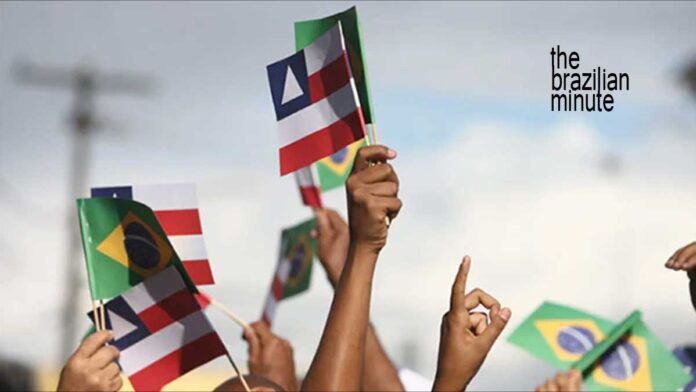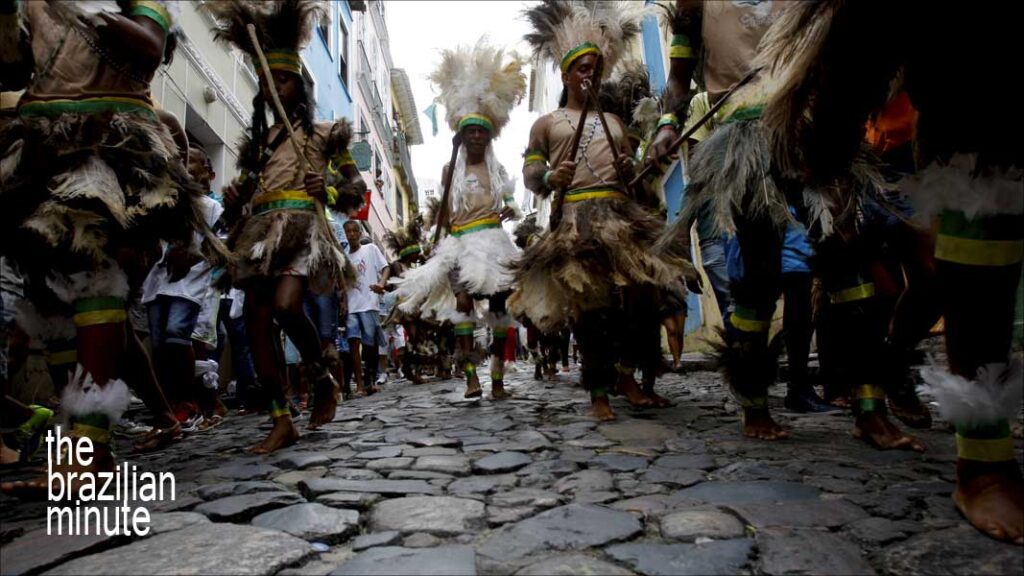
Bahians Protected The Independence Of Their New Nation.
Celebrating Bahia’s Independence Day is more than a state holiday. It’s an annual salute to the important, historic role that Bahia plays.
This series was presented by the Consulate-General of Brazil in Chicago and the Brazilian Foreign Ministry’s Cultural Department.
In celebration of Brazil’s Bicentennial year, 1822 – 2022
This week’s Brazilian Minute: Celebrating Bahia’s Independence Day
Catch up with other Brazilian Minute episodes you may have missed!
Script from Audio:
Every year on July 2nd, citizens of Brazil’s first capital come together to celebrate Brazil’s independence from Portugal. It’s Bahia’s Independence Day.
It was on this date in 1823 that proud Bahians ended a war against three thousand soldiers of the Portuguese Empire. Outnumbered two to one, these fierce battles brought together Bahians of all races to fight for the country’s freedom.
It marked the final conflict before Portugal was expelled from the region and from Brazil.
Victorious, Bahians marched through the city of Salvador. Today, people walk that same route to begin their celebration of independence.
The national anthem is played, the Bahian and Brazilian flags are raised, and everyone gathers at Nossa Senhora Rosário dos Pretos, for a tribute to the heroes of independence.
Read and listen to new weekly episodes of The Brazilian Minute. It’s brought to you by the Consulate General of Brazil, in Chicago and the Brazilian Foreign Ministry’s Cultural Department.

More on: Celebrating Bahia’s Independence Day
Overview:
The northeastern state of Bahia sits just below South America’s hump. Bahia has played an important role throughout Brazil’s first two hundred years as a nation.
In fact, Bahia’s place in this history began centuries earlier. In 1500, Portuguese explorers landed near the Bahian city of Porto Seguro to claim the land and to begin Brazil’s story. Salvador, Bahia became Brazil’s first capital.
Bahia is the nation’s cradle of culture. It has nurtured the arts across races, religions, and the decades.
Bahia lives its history.
The Events Leading To Bahia’s Independence Day
The events leading up to Brazil’s independence are remarkably different than those of the United States.
The Napoleonic War forced Portugal to move the seat of the Empire from Lisbon to Rio de Janeiro in 1808. The Royal family returned to Lisbon in 1821. They left their 23-year-old son, Pedro I to govern the land as Prince Regent.
However, Pedro I’s view of the colony’s future was quite different from the Empire’s expectations. The Prince Regent set into motion a plan for Brazil’s independence.
18 months later, Pedro I rode to the banks of the Ipiranga Brook in São Paulo. Surrounded by his Guard of Honor, he raised his sword to proclaim, ‘Independência ou Morte” (Independence or Death). The date: September 7th, 1822.
Independence was viewed as a settled matter in Rio de Janeiro, Sao Paulo, and nearby provinces. Elsewhere, Portugal’s armies maintained firm control of the colony.
Brazil’s war for independence began with Pedro I’s September Proclamation, lasting until the new year of 1824.
Battles to the north
These early skirmishes were carried out by loosely organized militias against Portugal’s well-trained troops.
Battles were fought, especially in the northern provinces. These included Piauí (the Battle of Jenipapo), Maranhão (the Siege of Caxias), and The Siege of Belém.
Ultimately, Brazil’s war for independence from Portugal centered on Bahia.
By land and sea
Salvador, Bahia became the stronghold for Portuguese loyalists. Lisbon was quick to dispatch ground and naval forces to the city to quell the uprisings. The first of these – The Battle of Pirajá – occurred on November 8, 1822.
The battle took place in a single day. Portugal’s greater military strength caused Brazil’s militia to consider retreat.
Instead, bugler, Luis Lopes sounded the “Advance”. Ultimately, it caused the Portuguese to panic and eventually cede victory. Luis Lopes became a hero of Bahia’s independence.
On the 4th of May, 1823, a strategic conflict took place on the open sea near Salvador. Fleet Commander Thomas Cochrane ordered Brazil’s fledgling navy of seven ships against 13 ships under Portugal’s flag.
But Portuguese loyalists aboard Brazilian ships revolted. Sabotage scuttled Cochrane’s original plan, forcing his retreat. However, the result of Cochrane’s action led to a successful naval blockade. It kept Portuguese ships from landing in Salvador.
Meanwhile, the ground battle continued on the outskirts of the city. Ultimately the Portuguese army was forced to retreat to the city’s center.
Cut off from provisions and munitions by Cochran’s blockade, fatigue began to set in for the Portuguese loyalists. Ultimately, they were pushed to flee the country.
July 2nd, 1823 is the date that Brazilians reclaimed Bahia. This day marks the consolidation of Brazil’s independence as a nation.
Desfile do Dois de Julho
The Parade of July 2, celebrates Bahia’s Independence Day in Salvador Bahia annually. The state holiday is listed as a cultural asset by the Institute of Artistic and Cultural Heritage of Bahia (IPAC).
The daylong event is a popular attraction with tourists from across Brazil and other countries. Activities begin at Largo da Lapinha in the Dois de Julho Pavilion next to the Parish of Lapinha.
Here, a parade reenacting the original celebrations of victorious Bahians in 1823 begins. It traces its way through several historic streets until it reaches the Dois de Julho square.
Learn more about the traditions and festivities surrounding Bahia’s Independence Day, here.
Music, Travel, Friends and Fun! 2022 marks Connect Brazil’s 25th year.
Celebrating Bahia’s Independence Day
Did you enjoy ’Celebrating Bahia’s Independence Day’? If you did, why not join us at Connect Brazil?
Sign up for our emails on Brazilian music, travel, friends, and fun. Listen to our ‘always live’ streaming station and streaming music channels, always free. Visit us on Facebook, and Twitter, and browse our Lifestyle Directory for Brazilian events coast to coast.










